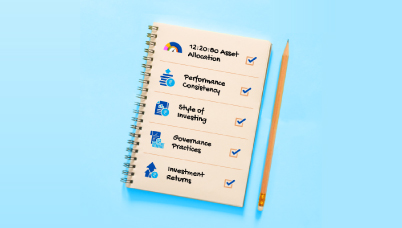Invest prudently in mutual funds to fight inflation
Posted On Friday, Feb 21, 2014
Confused?? Don’t be. Looking at the way inflation is eating into our savings; this type of unusual eating preference could start to play around with our financial goals.
Inflation bites us at every small step of life. When you were in college, you might not have enough money to watch every movie at the cinemas or buy clothes from that one brand you desire, therefore you must have promised yourself that you could do everything that you always wanted once you get yourself a job.
Surprise!! ….You still can’t! As those designer jeans or tickets to the movies have become that much costlier.
All you might be doing is keep wondering why you still find yourself longing for those things? It is all due to one phenomenon – Inflation. When you were in college, the prices for the things you wanted to do must be let’s say Rs. 100, but now due to inflation rising fast the cost of those things would have gone up assuming to Rs. 300. Movie tickets are the best example of this. Remember, rising prices (inflation) will mean that your money is actually worth less and less as time goes by.
To judge how much money you are really making, you need to take inflation into account. For example, if inflation is 8 per cent and your money is in a deposit that earns 9 per cent, then your inflation adjusted return is around 1 percent or less.
Inflation plays a major role
Inflation Rate of 8% and its impact over your purchasing power
| Year | 2014 | 2020 | 2025 | 2030 | 2040 | 2050 |
| Amount | 10,000 | 15,869 | 23,316 | 34,259 | 73,964 | 1,59,682 |
Inflation adjusted returns
| Inflation Rate | 8% | 8% | 8% |
| Returns | 12% | 15% | 18% |
| Returns after Inflation | 3.70% | 6.48% | 9.26% |
So what is the next best step?
How do you save yourself from the monster called inflation? Its simple really, Invest prudently!Easier said than done though, and brings about questions like where should you invest, what should you invest in? Mere saving will not help you combat inflation; you need to invest those savings wisely.
To generate more money out of your savings, start investing regularly. But before selecting any investment option it’s important to figure out your investment goals and objectives and the time period required to achieve them. Once these basic parameters are fulfilled, you need to decide which asset class and investment option will suit your requirement the most.
There are many asset classes including but not limited to Equity, Debt and Gold.
Equity Investments
Beating inflation could involve investing in instruments which have a slightly higher risk. Saving through market linked products might prevent inflation from eating into your returns. Equities can be one such asset class to give you good returns in the long run. It is important to understand that equities are more of a long term investment option, since generally equities as an asset class is expected to give good returns over a long period of time.You may choose to invest directly in the market on your own, but you need to have the expertise and more importantly the time to manage your portfolio. In such a fast paced world it is suggested to outsource what is not your core competency. If you do have the time and resources then maybe you can invest in equities directly, for those of us who don’t - investing in equity mutual funds could be a better option since a mutual fund involves professional Fund Managers managing your money, therefore potentially reducing the chances of taking a wrong call on a stock.
Debt Investments
This type of fund invests in fixed income instruments such as debentures (bonds), Treasury Bills etc. This is preferred by investors who are not willing to take much of risk and have an intention to earn returns higher than what are possible to earn from other avenues like Fixed Deposits. Generally, fluctuations in the NAV of debt fund is less than the equity fund.Gold Investments
Gold is innate to Indian culture but buying physical gold attracts costs like making charges, wastage charges etc. Today, comparatively efficient forms of buying and owning gold like Gold ETFs / gold savings fund have become available which can save additional costs/ charges associated with the traditional form of buying. Apart from the fact that in case of physical gold there is danger of theft, other advantages of owning gold through mutual fund route are:| 1. | Reasonable: You can buy gold in small proportions |
| 2. | Value: Trades like a normal equity share on the exchange - in tandem with domestic gold price |
| 3. | Low Denominations: Invest in Gold with as little as Rs 500! |
| 4. | Protection: The gold is stored in secured vaults |
While the inflation is soaring, if you plan out your investments prudently, you won’t just save, but also successfully grow your hard earned money. The above options are different investment avenues from different asset classes, it is also important to diversify your savings across a few of these investment options and create a balanced portfolio.
It is always advisable to consult your financial advisor to help you with your investments.
The views expressed here in this article are for general information and reading purpose only and do not constitute any guidelines and recommendations on any course of action to be followed by the reader. The views are not meant to serve as a professional guide / investment advice / intended to be an offer or solicitation for the purchase or sale of any financial product or instrument or mutual fund units for the reader. The article has been prepared on the basis of publicly available information, internally developed data and other sources believed to be reliable. Whilst no action has been solicited based upon the information provided herein, due care has been taken to ensure that the facts are accurate and views given are fair and reasonable as on date. Readers of this article should rely on information/data arising out of their own investigations and advised to seek independent professional advice and arrive at an informed decision before making any investments.
Mutual fund investments are subject to market risks read all scheme related documents carefully.
Related Posts
-

Do You Need to Update Your KYC/Modify KYC?
Posted On Friday, Apr 26, 2024
New KYC Regulation Effective April 1st 2024
Read More -

Are You Stuck in the Past or Ready for a Secure Future?
Posted On Wednesday, Jun 29, 2022
The ever-growing number of mutual fund schemes on offer has made it challenging for investors to select the best and most suitable one.
Read More -

Received an Increment? Step-up Your SIPs
Posted On Wednesday, Jun 01, 2022
For instance, let’s assume that you have registered for a monthly SIP of Rs 5,000 for a 10-year period and later on try to step-up the SIP at an annual frequency, say by Rs 500. In the first year...
Read More



